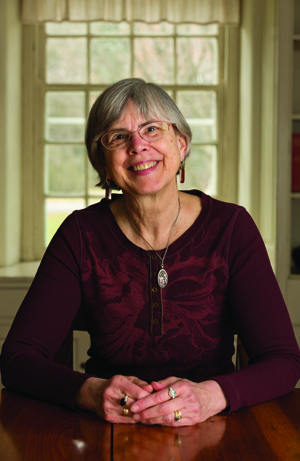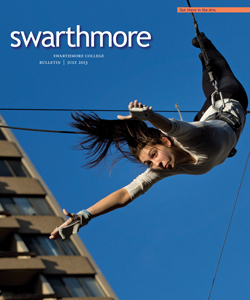A Convergence of Friends
Margery Post Abbott ’67 Seeks to Harmonize Liberal and Evangelical Quaker Traditions

Margery Post Abbott addressed spirituality and social action at Pendle Hill this spring. Photo by Laurence Kesterson.
“It’s very important for me to be a Quaker. I can’t imagine being anything else,” Margery Post Abbott ’67 says quietly but emphatically. She recently returned to Pendle Hill, the tranquil Quaker study center across the Crum Creek from Swarthmore, to lead a course on incorporating faith in social-justice work. Her course addresses an even larger question posed on her web-site, 21stcenturyquaker.com: Should Friends focus more on spiritual matters or on social activism? Her answer, as exemplified by her life, is to do both.
The workshop is just one of many she has led in her extensive travels throughout the United States and abroad. Her teaching supplements dozens of publications she has written on Quaker spirituality—her newest title is To Be Broken and Tender: A Quaker Theology for Today. Reinforcing her belief that faith and good works go together, Abbott has also been politically active, most recently as presiding clerk for the Friends Committee on National Legislation (FCNL), the Quaker peace lobby on Capitol Hill. Abbott sees FCNL as “bringing our faith into the political marketplace. You treat the people with whom you strongly disagree with the same respect you treat your friends.”
Abbott grew up in the liberal,“unprogrammed” Quaker tradition, which consists of silent communal worship, with individuals speaking only when moved to do so by the spirit of God believed to be in every person, rather than following a set liturgical service as most denominations do.
She studied at Germantown Friends’ School in Philadelphia before attending Swarthmore and representing the fourth generation of her family at the College. Like her parents, she found herself in a Quaker matchbox when she married Carl Abbott ’66, a professor of urban studies and planning at Portland State University. Her husband, Margery proudly points out, is “a major figure in urban history and now is writing about the treatment of cities in science fiction.”
The Abbotts moved to Portland, Ore., 35 years ago. It was during this journey West that she discovered another branch of Friends—those who embraced churches, pastors, hymns, and a more “programmed” evangelical approach to their faith. They turned out to represent the majority of this country’s Quakers. Her response to this revelation was, “I don’t know what being a Quaker is all about!”
But from her own family history, she did know about the power of reconciliation. Nearly a century after an 1827–28 split between the orthodox branch of Quakers and the more progressive Hicksite Quakers (who founded Swarthmore College), Abbott’s Hicksite grandmother wed her orthodox grandfather—the first such intermarriage in their divided Long Island, N.Y., community.
Her personal background, says Abbott, explains “the constant theme of my writing—what it is to be a Quaker and looking at that in different ways.” Increasing understanding between women evangelicals and liberals in the Pacific Northwest is part of her ongoing exploration. What began as small gatherings of women from the two backgrounds has blossomed into a biennial conference, which over the years has involved several hundred women who freely discuss “the hard issues—theology, sexuality—some of these things that have torn us apart for a long time,” says Abbott. Her collaborative approach, which has included co-teaching workshops with evangelicals, has attracted great interest at Pendle Hill.
Abbott’s quest to bring together the evangelical and liberal communities has inspired her study of Quaker history, and her website features some of her commentary on the topic. As managing editor of the Historical Dictionary of Friends (co-edited with Mary Ellen Graffin Chijioke ’67, longtime librarian at Friends’ Historical Library), Abbott was careful to provide comprehensive definitions of controversial issues, including early Quaker beliefs and a full range of current views on each subject.
She is also keenly interested in broadening understanding among Quakers worldwide. Travels to England, Kenya, Palestine, Israel, and elsewhere motivated her to include international Friends in her books, especially given the dearth of such information in general Friends literature.
Her immersion in the Quaker faith as an author and speaker has been, in Abbott’s words, “nothing I had ever thought about doing” when she was a Swarthmore chemistry major. “I did as little writing as you can possibly do at Swarthmore,” she claims. “I’ve always been very quiet, so I had to learn to talk.” She experienced a “real sense of a call” to work on questions about who Quakers are and how they should move forward.
Now a member of an informal group of “convergent Friends” who gather monthly for a mix of evangelical and liberal worship, Abbott also has worked closely with the Friends World Committee for Consultation, whose purpose is to “encourage fellowship among all the branches of the Religious Society of Friends,” which aptly describes Margery Post Abbott’s personal mission, too.
 Email This Page
Email This Page